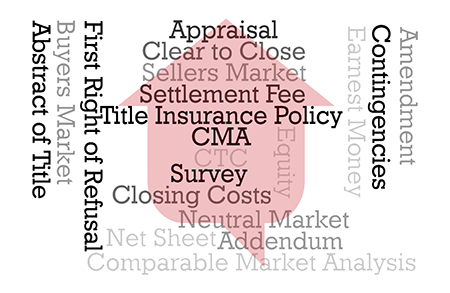
Real Estate Terms – What Does That Mean?
Definitions of Real Estate Terms
Real Estate Terms – Every industry has terms that are unique to it. Real Estate is no different. For instance, we might not need to know the definition of a “anemometer” like a coal miner would but there are terms home buyers and sellers should know!
Below are some terms associated with real estate. It helps to be familiar with them when buying or selling homes. Arranged alphabetically.
Let us know if you want more or specific definitions!

Abstract of Title –
The Abstract of Title is all information pertaining to a certain property. It is recorded and maintained in Indiana usually at the County level. The document contains anything and everything affiliated with the property. This includes deed and title changes, liens on the property, easements, and more.
It’s the written history of the ownership history and more!
Addendum –
An addendum is an addition to a contract. For instance, the buyer and seller want to include a mower with the sale of the home that wasn’t in the original agreement. They use an addendum to add the mower.
An addendum adds to the contract when both parties are in agreement.
Amendment –
When you change the terms of an existing contract you need an amendment. For example, the closing date is moved (forward or backward) from the date originally agreed to in the purchase agreement (contract.)
An amendment amends/changes the original terms in some way. By the way, both parties MUST agree with the change in order to amend the contract.
Appraisal –
The appraisal is ordered by the lender and typically paid for by the buyer. An unbiased, third party appraiser determines the value of the property to ensure it’s worth the agreed upon purchase price.
Appraisers are governed by Federal and State agencies.
Buyer’s Market –
The Real Estate Market is said to be a “Buyer’s Market” when the supply of homes available to purchase exceeds the number of buyers looking to buy a home.
When supply is high and demand is low, it’s a Buyer’s Market.
Clear to Close (CTC) –
This is the term mortgage brokers and lenders use to say that the mortgage application file has received final approval and the transaction may close.
Above all, this is one of the BEST phrases in real estate for home buyers and sellers!
Closing Costs –
Closing Costs are costs and fees associated with buying a home and lenders. For instance, the following fees are usually considered closing costs in Indiana:
- Loan Origination Fee
- Credit Report
- Flood Certification
- Lender’s Title Insurance Policy
- Homeowner’s Insurance Premiums
- Prepaid Interest
- Property Taxes
- Mortgage Insurance Premiums
- etc…
Some other fees that are usually included but must be approved by the lender in order to include them are:
- Survey
- Home Inspections
- Pest Inspections
- Home Warranty
- Appraisal
- etc…
A buyer’s offer may include asking the seller for assistance in paying the closing costs. This can run from $1,000 to $6,000 depending on the loan type, property and purchase price.
When sellers agree to this, they will give an amount that will show as a “credit” from the seller on the ALTA Final Settlement Statement.
Settlement Fees are different. SEE: Settlement Fees below
Comparable Market Analysis (CMA) –
Real Estate Agents complete a CMA for seller’s thinking of selling their home. The CMA compares recently SOLD, similar properties to the subject property to determine the Market Value of a property.
Similarities include square footage, location, improvements, condition, etc… Home that were sold under duress (foreclosure, bank owned, short sale, tax sale, etc) are NOT used in CMA’s for Market Value.
SEE Market Value below.
Contingencies –
A contingency refers to a “condition” that must transpire in order for the contract and sale to move forward. If contingencies aren’t met, the contract is null and void. There are different types of contingencies.
For example, in Indiana, if a mortgage loan is being used as payment for the property, the Purchase Agreement is automatically contingent on the buyer being able to secure a loan. This is a Financing Contingency.
Or, a buyer may have their current home on the market but their mortgage pre-approval is contingent on that home selling first. This contingency usually has a specified amount of time the buyer has to sell their current home.
Other contingencies might include appraisal, inspections, or any other term the buyer and seller agree upon in the purchase agreement.
Earnest Money –
Earnest money is the “consideration” item of value the buyer is bringing to the table (the seller is bringing the property.)
In Indiana, the Listing Brokerage (or another entity whom all parties agree upon,) will deposit the earnest money into an escrow account. At the closing appointment, the broker turns the earnest money over to the Title Company. The Title Company has applied the deposit as a credit to the purchase price on behalf of the buyer.
Equity –
In real estate, “equity” refers to the difference between what is owed on a property (to the mortgage holder) and the fair market value of the property.
If you owe $100,000 on your home and the fair market value is $150,000, then you have $50,000 in “equity” in your home.
As the real estate market changes, so does the equity a seller has in their home. It can go up or down – depending on the market.
Market Value –
The market value of a home is determined by many factors including the type of local real estate market (Seller’s, Buyer’s, Neutral) and the law of supply and demand.
The recent history of the local real estate market is researched for similar homes sold. Adjustments are made, if needed, for the condition, improvements, and location when compared to the subject property. The valuation is said to be “what the market will bear” as a value for the property with comparables to back it up.
Appraisers will use the comparable sales approach (in addition to others) when determining value of the property.
Net Sheet –
A net sheet is a document agents create for home sellers as an estimate of their net proceeds based on the terms of an offer. Often times, they also prepare a net sheet when first listing their home based on the suggested listing price.
Neutral Market –
A neutral market is a balanced market. Overall, it does not favor buyers or sellers. Typically, interest rates are affordable and the number of buyers and sellers in the real estate market are equal.
Purchase Agreement –
A purchase agreement is the document used to lay out all of the terms of an offer to purchase a home. This includes price, what’s included, what’s excluded, financing, tentative closing date, inspections, earnest money and everything else. This contract – along with any amendments or addendums – contains the agreed upon terms of the sale.
Seller’s Market –
The Real Estate Market is said to be a “Seller’s Market” when the number of buyers looking to buy a home exceeds the number of homes available (for sale.)
When demand is high and supply is low, it’s a Seller’s Market.
Settlement fee –
We use Title Companies when selling property in Indiana. The settlement fee is the fee charged to conduct the settlement of the transaction. These fees vary between title companies.
Other title fees may include:
- Recording Fees
- Title Search
- Title Insurance Policies
- Deed Preparation
- Wire Transfer Fees
- Attorney Fees for Deed, etc…
Survey –
There are two types of surveys:
- Boundary Survey
- Survey Location Report
The Boundary Survey sets the corner markers and verifies the boundaries of the property.
A Surveyor’s Location Report locates existing monuments, buildings, fences or other improvements on the property.
Title Insurance –
There are two types of title insurance policies:
- Owner’s Title Policy – An owner’s policy protects the buyer from future claims on the property. The title company will fund your defense and work to settle a problem that occurs after closing. This lasts for as long as you own an interest in the home. In Indiana, the seller of the home usually pays for the Owner’s Policy.
- Lender’s Title Policy – Most lenders require a Lender’s Policy. It protects their interest in the property should there be a problem with the title down the road. The buyer pays for this title policy.
The policies cover situations like ownership by another party, incorrect signatures on documents, forgery and fraud concerning title documents.
Real estate transactions can be tricky. You’ll have more confidence when you understand these real estate terms and how they work.

